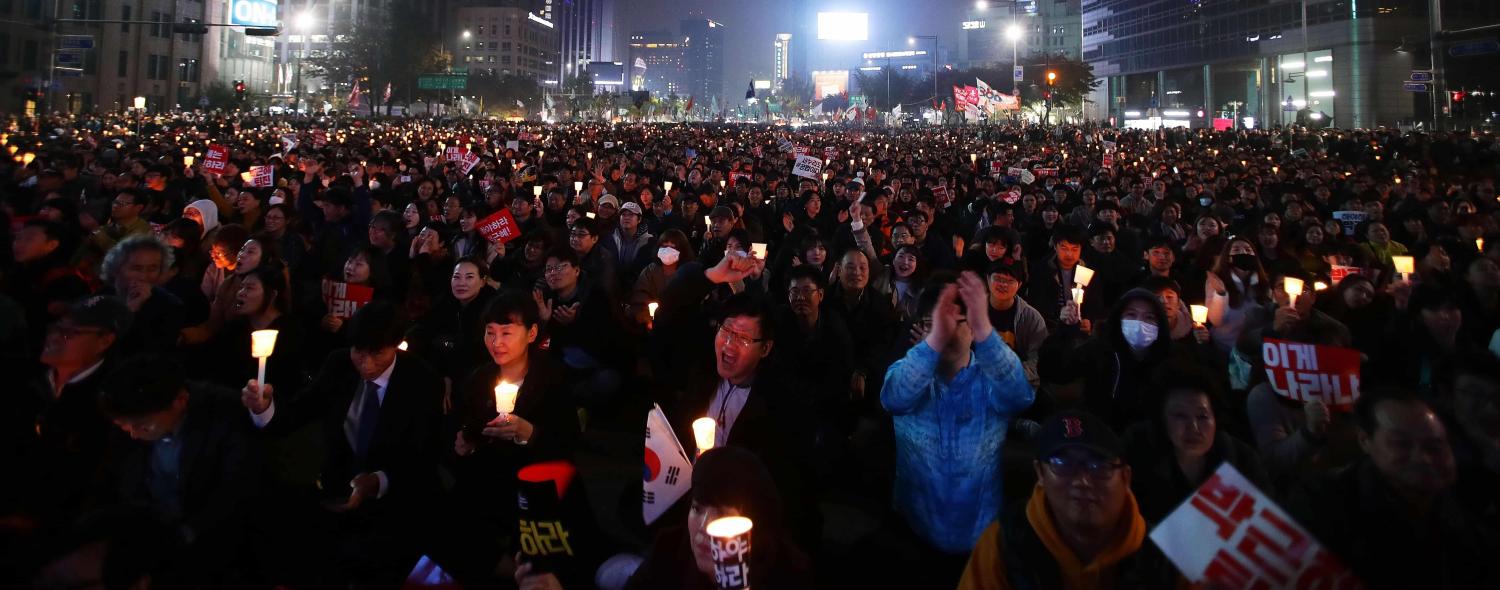South Korea has been rocked by allegations that the nation is actually run by a shadow government, but its people are riding for a fall by directing their outrage at President Park Geun-hye. What is needed to achieve lasting change is not the president’s resignation, but reflection on the societal roots of the problem.
Every day we seem to learn that Park’s longtime friend, Choi Soon-sil, the daughter of a religious cult leader, has yet another tentacle wrapped around the government. The corruption pit is now so deep that it’s difficult to triage all the damage that’s been done, but a chronological list of Choi’s recent sins would begin with the Mir Foundation, a nonprofit organisation she set up in October 2015 that managed to fundraise $43 million in under 48 hours. It was later revealed she’d used her relationship with Park to browbeat money out of the nation’s most powerful conglomerates.
The scandal took a hard turn last month when Choi’s alleged male escort, the former professional fencer Ko Young-tae, said in an interview that Choi’s favorite pastime was editing presidential speeches, implying a grossly inappropriate level of influence over Park. 'You’d have to be crazy to believe this,' Park’s chief of staff said, but copies of presidential speeches and cabinet meeting notes were later found saved on Choi’s tablet before the events had taken place. Choi surfaced in Germany days later saying she wasn’t coming back. When she lawyered up and did return, rumours spread that the woman in custody is a body double who was paid to serve Choi’s time. And if that sounds too conspiratorial to be true, bear in mind it happens all the time in China. Besides, it’s easily the least conspiratorial-sounding aspect of this story.
Choi’s father, Choi Tae-min, was the founder of a pseudo-Christian shamanistic cult and there are rumors that Choi is the new head, Park is a brainwashed follower, a cabal known as the ‘eight fairies’ runs state affairs, and that Park performed a cult ritual during her inauguration and has included incantations in her speeches. But it gets better. Park also allegedly changed the seal of the National Intelligence Service to that of a dragon because dragons are revered by members of the cult (the Mir Foundation, for instance, is named after an old Korean word for dragons, mireu). And there are allegations that Choi has been using the 2018 Winter Olympics budget as a slush fund, that she struck arms deals and treaties with foreign nations, had the entire culture ministry in her pocket, and was responsible for Hanjin Shipping’s demise.
'This isn’t even a dictatorship,' said Choo Mi-ae, chairwoman of the Minjoo Party, 'it’s a terrifying theocracy.'
The Merovingian kings had their Mayors of the Palace, Cardinal de Richelieu had his Père Joseph, Nicholas II had his Rasputin and President Park has her Choi. But what’s worrying here is that Koreans have decided Park is the main villain of the piece and that Choi’s occult background is particularly offensive. But Park isn’t the monster her opponents want her to be. Choi’s father took advantage of her vulnerability by claiming he could put her in touch with her dead mother. In her grief, Park believed him. It's also odd that the cultish elements would so severely offend Koreans, given that one seventh of them identify as ‘neoreligionists’ and shamanism is rampant in Korean Protestant Christianity. Andrew Eungi Kim, professor of sociology at the University of Toronto, has written extensively about this. Perhaps the most famous example is Yoido Full Gospel Church, the world’s largest congregation, which has faced criticism for teaching prosperity theology, which in Korea has its roots in shamanism and the practice of casting spells to bring oneself material wealth.
Pseudo-Christian shamanistic cults wielding political power are nothing new, either. Consider the Unification Church, which like Choi Tae-min’s cult began as a Christian anticommunist group that promoted Korean culture overseas (the nonprofit organisations set up by Choi and his daughter have similarly focused on promoting Korean culture). Their leader, Sun Myung Moon, founded the Washington Times and used it to publish anticommunist propaganda. He was also involved in his own influence-peddling scandal involving ten members of US Congress, known as Koreagate.
The problem here might not be Park or even Korea’s éminence grise, but public support for such cults, the toxic blend of shamanistic Christianity and political aspirations or the favor that’s so readily paid to anyone who claims to be promoting Korean culture overseas. Unfortunately for now, however, it seems the people are more interested in political scalps.
Photo: Getty Images/Chung Sung-Jun
